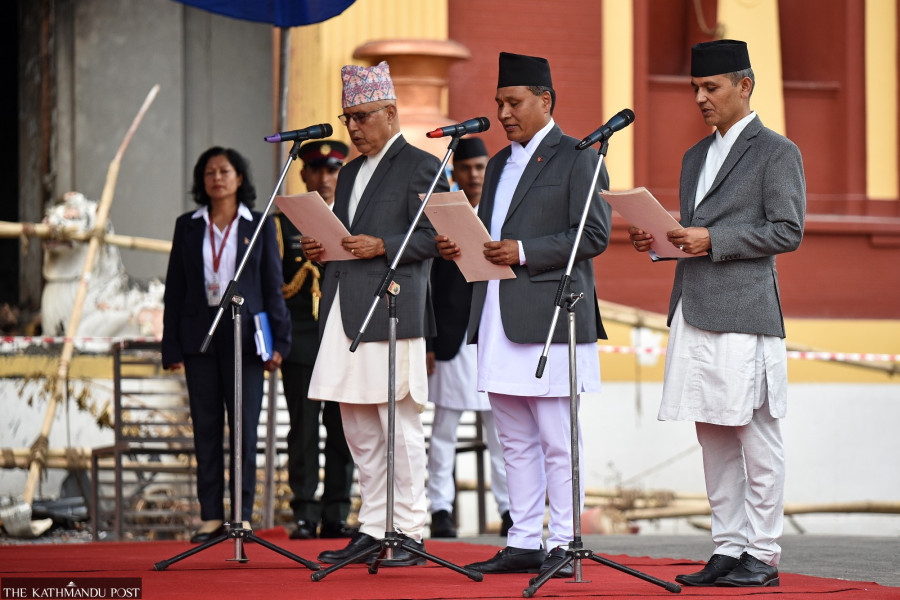Columns
Open letter to energy minister
Greater transparency and energy sector policy reforms must accompany efforts to end corruption.
Bishal Thapa
Dear Honourable Energy Minister Ghising,
Congratulations on your appointment as the Minister of Energy, Water Resources and Irrigation!
The Gen Z movement represented a call for an end to corruption, improved governance and equal opportunities for all. Throwing out the old set of political leaders that had failed to deliver on those demands was a step in that direction. The many burnt and destroyed buildings associated with the old political leadership that are now scattered across the country are a grim reminder of how intense the call for change was.
As a minister of the new government following the Gen Z movement, you bear a large responsibility of delivering on the aspirations of a whole generation of Nepalis. You and other ministers have the support of the whole country as you lead the nation through this critical moment.
As you build new ideas for positive change, I’m sure you are listening to a whole array of new stakeholders, especially those that were not previously represented in the old decision-making process. Though unsolicited, I offer you my suggestions below that hopefully provide some additional data points and perspective as you shape your approach.
Electricity must benefit people and increase incomes
Nepal’s energy sector has deeply failed the people of Nepal. The endemic corruption that was part of the sector was one part of that failure. Poor policies that were built on incorrect narratives benefited only a small group of people but created large inequalities that left many Nepalis perpetually mired in energy poverty.
A Nepali on average (or per-capita electricity consumption) currently uses approximately 380 kWh energy per year, one of the lowest consumption quantities in the world. Of the 4.7 million households with a metered grid connection, approximately 2.1 million—or 45 percent—consume only about seven kWh per household per month on average. That is barely enough to power a few light bulbs. The remaining 2.6 million households consume roughly 119 kWh per household each month on average—still one of the lowest in the world.
These statistics describe the depth of Nepal’s energy poverty. Nepal’s economy and livelihoods have not benefitted from the abundance of electricity in recent years.
Success and prosperity in Nepal’s energy sector cannot be measured in terms of how much electricity we produce, or the billions of rupees that we earn from exports of electricity to India. Instead, success and prosperity must be measured by the amount of modern and clean energy that people can access and use, along with the livelihoods and income growth it generates.
As the energy minister, you have the authority to begin the process of reforming the energy sector. As the first step in the reform process, I hope you will drop the rubbish idea that, as a measure of success, Nepal should celebrate how much electricity we generate and export to India. Nepal should celebrate the end of energy poverty, whenever that occurs, and nothing else.
Reform Nepal Electricity Authority
The Nepal Electricity Authority (NEA), the country’s monopoly power utility, is easily one of the most corrupt institutions in the country. For many years, corruption within the NEA has been state-sponsored. It felt as if corruption within the organisation was condoned and sanctioned with implicit knowledge of the organisation’s management.
As a former managing director of the NEA who may have attempted to end corruption in the authority, you are likely aware of the challenges that lie within it. A broader set of corporate and governance reforms is the only way to end corruption in the NEA and get the organisation to perform better.
As energy minister, you are the chairperson of the board of the NEA. I hope one of your first acts will be to introduce a wider range of corporate and governance reforms within it. The country needs a robust NEA board that includes truly independent directors, as the law requires, instead of political appointees benefiting from their connections.
I hope you will consider reforming the NEA with global governance best practices relevant to state-owned enterprises, such as stronger right to information, improved transparency and civil society engagement in anti-corruption vigilance.
Nepal’s electricity must go to Nepalis
Nepal’s electricity must first fulfil the needs of Nepalis.
The lack of energy for rural areas is at the heart of Nepal’s dramatic decline in agriculture. Declining food production, growing imports, shrinking agricultural lands, limited agricultural productivity growth, the failure to build cold storage and improved food chains, and lack of investments in agro-industries all stem from one fundamental flaw: The lack of reliable energy supply to agriculture.
The absence of reliable electricity has undermined electrification, modernisation and mechanisation in agriculture that could have improved productivity and farmer incomes. Instead, Nepali agriculture has remained trapped in traditional methods almost entirely because electricity has not been available to drive the transition to modern and mechanised methods.
Energy use in Nepal’s agriculture, for example, remains exceedingly low, approximately 22 kilograms of oil equivalent per agricultural worker in 2021. Other developing countries use approximately four times that energy input in agriculture, suggesting much higher levels of mechanisation than is the case in Nepal.
Not enough investments are flowing to improve the quality of transmission and distribution infrastructure in rural agricultural areas that are critical to reliable supply into those areas. Electricity access alone is not enough. The distribution network serving these areas must be enhanced and modernised.
Transmission and distribution infrastructure feeding rural and agricultural areas must be significantly strengthened—they are currently too weak and outdated to support widespread mechanisation in agriculture.
I hope that as energy minister, you will find the courage to reconsider this false narrative about the adequacy of electricity supply for Nepal. Or if not that, at least you will open the sector up for honest debate so that better policies can be developed.
Improve transparency
Nepal’s energy sector is opaque, lacking the transparency for real and meaningful analysis of the sector. We cannot end corruption if no one can tell what happens within the walls of your office, or if the documents used in decision making are never made public.
Transparency is critical to improving governance and building better policies. I hope, as energy minister, you will allow for greater transparency. I hope, for example, you will make available all relevant documents, such as the power trade agreements between Nepal and neighbouring countries, the frameworks the NEA uses to grant power purchase agreements, along with data and information about the sector.
In addition to transparency, I hope you will consider providing public funding towards civil society engagement in the sector. Nepal’s energy sector is monopolised by ideas of a select few. This has led to faulty narratives, such as those about electricity supply adequacy. These have, in turn, enabled poor policies which have increased inequality and deepened energy poverty. Transparency and public support for independent research and analysis would promote stronger data and evidence-based policy making.
As the energy minister shepherding the country towards an election in six months, you cannot fix everything. But unlike your predecessors, we are counting on you to find the courage to open the energy sector so that it benefits all Nepalis.




 13.12°C Kathmandu
13.12°C Kathmandu















